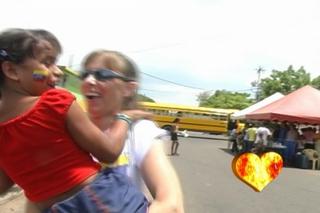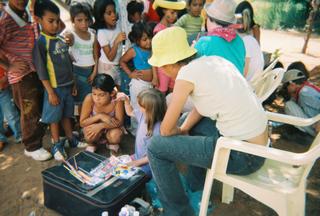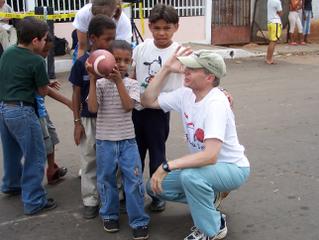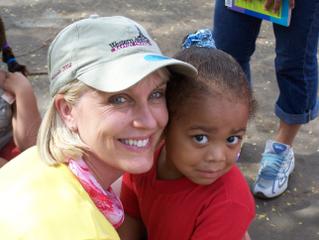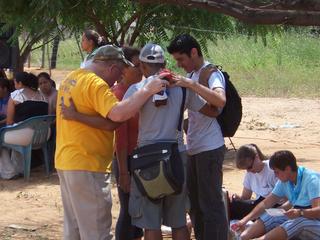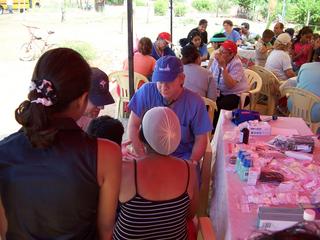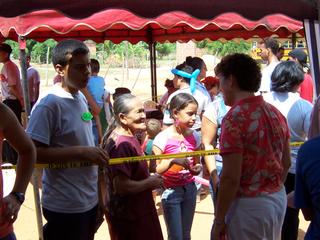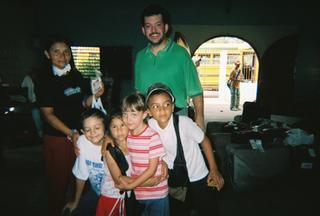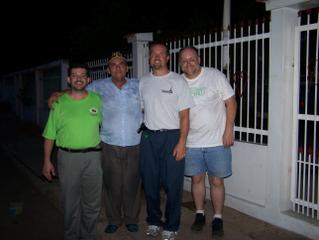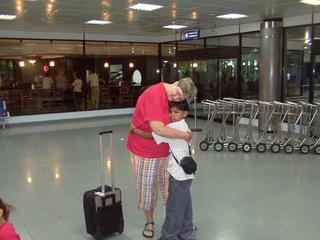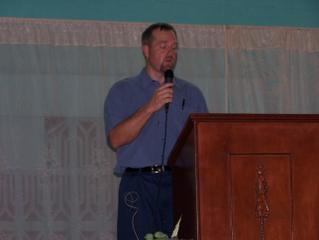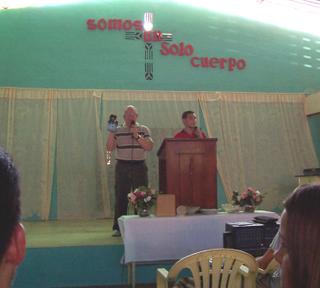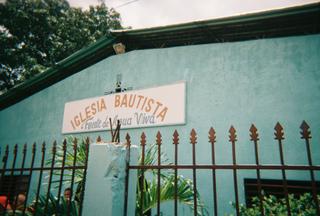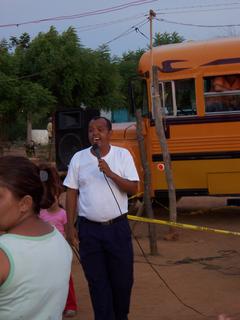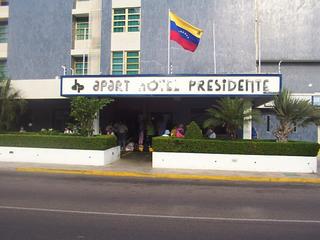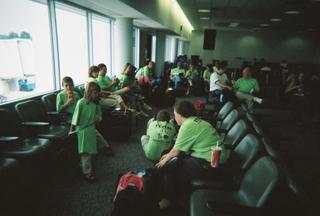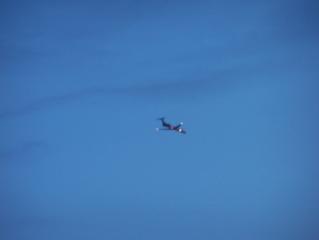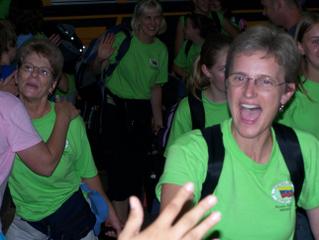This post, I'll convey something of the spirit of the Venezuelan people.
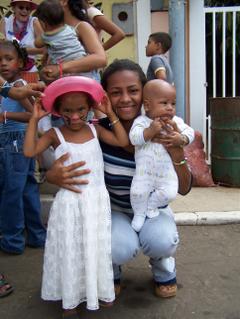
It may be a misconception that these are uneducated people. Literacy, as defined as people who can read and write over the age of 15, is reported to be over 93%. That's not bad at all. I found the Venezuelans to have a good sense of the world around them. I noticed that even poor children under 15 were able to spell. They are resourceful and mechanically inclined.
To this end, they take care of their automobiles. They may not be able to find the proper parts, but they have a knack for taking a similar part from another brand of vehicle and rigging it to work. You might see a classic Ford body with a Chevrolet engine, a Dodge transmission, Toyota power steering, and a smattering of replacement parts obtained according to what was available at the time.
On the roads are vehicles that range from the very old to the very new. There are mostly American cars, but imports from Asia and Europe can be found. On the same roads one can occasionally see a donkey pulling a cart with the driver often perched on the tongue of the cart next to the donkey. (Don't ask me how this works - I'm only reporting what I saw.)
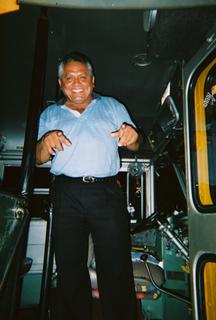
Speaking of roads - the traffic is astonishing. It appears to be some sort of agreed-upon chaos. They have traffic laws that are not enforced. As a result, there is an understanding how those laws are to be broken. I saw only one accident while I was there. This could be attributed to the fact that people drive with their horns - the louder the better. For example, when creating another lane in the middle of the road to pass a vehicle that is in one's way, a blast on the horn is a good idea. It lets people know where you are so they don't run into you.
We had two busses. Bus drivers typically own their own busses. Our bus driver was Levi (pronounced Leh'-vee, like the mounds that hold back the water in New Orleans). He is a devout Christian and loved to worship to the music he let the ITAM staff play on the sound system on his bus. In the middle of traffic he would raise his hands and praise God. This was disconcerting given the chaotic traffic in the city of Maracaibo.
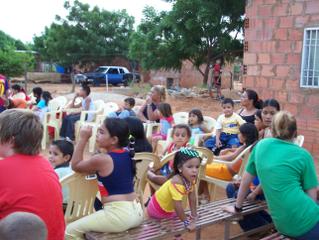
What I learned most about the Venezuelans is that they are conscientious people. The place we went on Saturday was a poor rural area on the outskirts of Maracaibo. Throughout the neighborhood could be seen houses that look like they've been torn down and are sitting in empty lots. In actuality, they are new construction. The people have very little. Instead of saving money to build all at once, they will buy a few bricks at a time and set them in place as they have the means lest their brother borrow the money. Consequently, construction takes awhile. They will use whatever building materials they can find. They will raise seedlings from wild trees and plant them in their yards so they have shade from the hot sun. They know they have less than many others and are not always willing to allow photographs of their dwellings. It is regarded as respect to ask before photographing. Poloroids are a good thing to have since they may want a picture to keep.
to be continued...
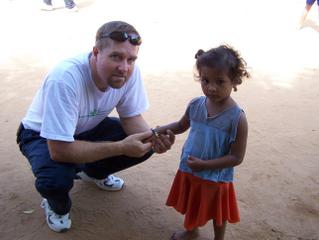 At the end of each clinic/carnival we would take down the equipment, clean up and gather to dance to a fun song: "Bueno es Dios". The last post, I included a picture of a lady praying to recieve Christ. At the dance, she broke into a "bump and grind" while holding up her new Bible and praising God for her new life. This was a little alarming, but recalling the prostitute who kissed the feet of Christ, we were comforted by the realization that the discipling she would recieve through the local outreach would produce in her a more appropriate modesty. Nevertheless, her exceeding joy was surely acceptable. If not, our level of spiritual maturity, low by the standard of God's righteousness, would not be acceptable as we intend it to be.
At the end of each clinic/carnival we would take down the equipment, clean up and gather to dance to a fun song: "Bueno es Dios". The last post, I included a picture of a lady praying to recieve Christ. At the dance, she broke into a "bump and grind" while holding up her new Bible and praising God for her new life. This was a little alarming, but recalling the prostitute who kissed the feet of Christ, we were comforted by the realization that the discipling she would recieve through the local outreach would produce in her a more appropriate modesty. Nevertheless, her exceeding joy was surely acceptable. If not, our level of spiritual maturity, low by the standard of God's righteousness, would not be acceptable as we intend it to be.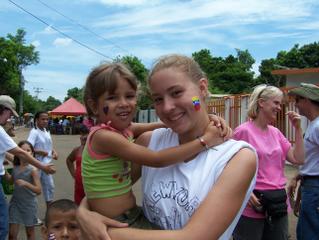 On one occasion, we had hats to distribute to some of the adults. Some desired to have hats for each of their children and there were simply not enough. A couple of adults, a lady and a man, became aggressive toward Ed Yarbrough and Cindy Rice. I came into the area in order to provide a stabalizing presence and things were relatively calm. The man who had caused trouble at one point walked past me and nodded his head in, what to me appeared to be, concession. During this ordeal, a vendor of cups of homemade frozen fruit pushed his cart into the street where we were holding the clinic/carnival. Both of the former aggressors, one at a time, went to the vendor, obtained a fruit cup each and presented them one to Ed and the other to Cindy. Recognizeing them as peace offerings, Ed and Cindy desired to honor this by eating them. However, because the water there is not clean, they were hesitant to even take a bite. Nevertheless, in the interest of reconciliation, they took a few token bites and walked to the bus to discard the rest. Fortunately, they didn't get sick.
On one occasion, we had hats to distribute to some of the adults. Some desired to have hats for each of their children and there were simply not enough. A couple of adults, a lady and a man, became aggressive toward Ed Yarbrough and Cindy Rice. I came into the area in order to provide a stabalizing presence and things were relatively calm. The man who had caused trouble at one point walked past me and nodded his head in, what to me appeared to be, concession. During this ordeal, a vendor of cups of homemade frozen fruit pushed his cart into the street where we were holding the clinic/carnival. Both of the former aggressors, one at a time, went to the vendor, obtained a fruit cup each and presented them one to Ed and the other to Cindy. Recognizeing them as peace offerings, Ed and Cindy desired to honor this by eating them. However, because the water there is not clean, they were hesitant to even take a bite. Nevertheless, in the interest of reconciliation, they took a few token bites and walked to the bus to discard the rest. Fortunately, they didn't get sick.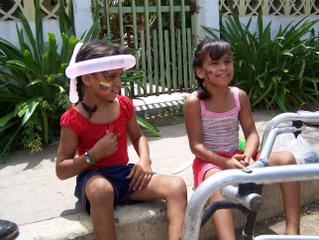 One of the clinics/carnivals was blessed with the presence of a beautiful pair of identical twins who had some sort of congenital handicap. One could walk, but was a little gimpy. The other required the use of a walker to ambulate. I'm told they went to the clinic, but there is nothing we could do for them. They enjoyed the carnival and were decorated with face paint, nail polish, bracelets, balloons, braids and hair clips. The most important gift came during the dance. Janine Bowman picked up the twin who needed the walker and danced with her.
One of the clinics/carnivals was blessed with the presence of a beautiful pair of identical twins who had some sort of congenital handicap. One could walk, but was a little gimpy. The other required the use of a walker to ambulate. I'm told they went to the clinic, but there is nothing we could do for them. They enjoyed the carnival and were decorated with face paint, nail polish, bracelets, balloons, braids and hair clips. The most important gift came during the dance. Janine Bowman picked up the twin who needed the walker and danced with her.